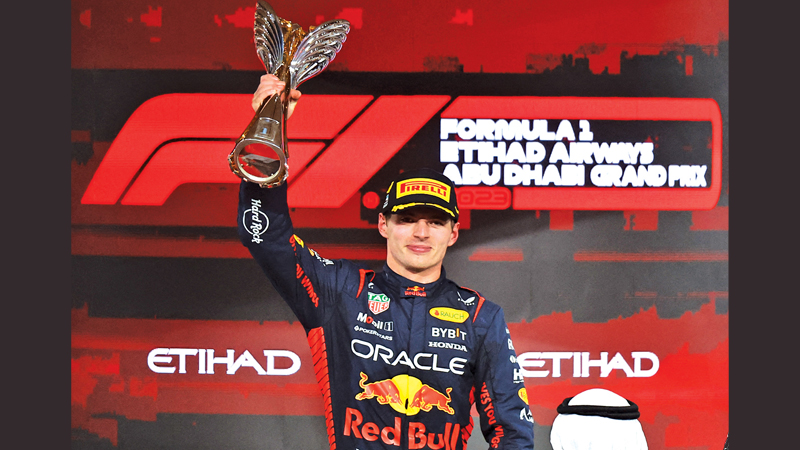The 2023 Formula 1 season drew to a close in Abu Dhabi on Sunday with another crushing Max Verstappen victory, and afterwards Mercedes team principal Toto Wolff likened the task of trying to beat him next season to conquering the highest mountain in the world.
“There is a Mount Everest to climb in order to catch up with Red Bull,” Wolff said.
If you know your mountaineering, even that analogy might not provide a sufficiently accurate metaphor for the challenge ahead of Red Bull’s rivals.
Verstappen and Red Bull have completed the most dominant season in F1 history on every metric. Given the scale of their advantage this year, perhaps K2 – not quite as high as Everest but notorious for being a significantly tougher test – would have been a more appropriate choice.
It certainly sounded that way from Lewis Hamilton’s tone at the end of a race in which he finished ninth, having not been close to competitive all weekend.
The seven-time champion has a tendency towards being monosyllabic when things have not gone well in a race, and this time was no exception. At the end of a series of curt answers, he was asked if he could describe his mood at the end of the final race of the season.
“Not great,” he said. “I just finished ninth. Two really bad races. Red Bull won by 17 seconds and they have not touched the car since August or July, so you can pretty much guess where they are going to be next year.”
What Hamilton is referring to is a fear that, with a car and driver in such dominant form, Red Bull have been able to turn development on to next year’s car much earlier than their rivals, and therefore will be at least as far ahead next year as this.
It is not only Mercedes carrying this concern. McLaren are the most improved team this season, and Lando Norris pointed out that, had the championship started when they introduced the big upgrade in Austria in July that moved their car forward by a second a lap, he and the team would be second in the championship.
But Norris added: “For anyone to catch them is going to be a massive step. They are not just quicker in pace, they are a lot better on [tyre] degradation, like they showed today, and Max is one of the best drivers. It’s a tough combination to beat but I feel like we are getting what we need to challenge.”
And Charles Leclerc, whose second place in Abu Dhabi completed a string of excellent races since an upgrade in Japan in late September brought the Ferrari back towards his driving style, said: “There’s still a long way to go before getting to the Red Bull pace, especially in terms of race pace. We are all aware in the team that there’s still a lot of work to do.”
Verstappen’s 19th victory in 23 races secured yet another landmark statistic in a season he has flooded with them.
His winning lap was his 1,003rd in the lead this season, making him the first driver to lead 1,000 laps in a year – 75.7% of all the racing laps in 2023.
The next closest is another Red Bull driver, Sebastian Vettel, who led 739 laps throughout 2011, at 65.23%.
To underline his superiority over the field, Verstappen revealed that not only was he aware of this possibility before the race, but he and his race engineer Giampiero Lambiase had planned their strategy around it. They deliberately delayed both his pit stops to give him more laps in the lead.
“I knew it was on the cards, of course, going into the race,” Verstappen said. “From the engineering side with the strategy, we wanted to try and plan it in a way that I wouldn’t pit too early. So, just wait for others to pit.
“To try and achieve that it was maybe not always the, let’s say, the fastest strategy. But I wanted to stay in the lead, to get the laps in.”
It was just the latest way he and Red Bull had chosen to rub the noses of their rivals in their helplessness.
Afterwards their team principal, Christian Horner, pointed out nothing could be taken for granted in terms of their success, and that they brought to an end Mercedes’ run of seven drivers’ titles in 2021 the year after the Silver Arrows’ most successful season.
“If you remember, that was their most dominant year ever and yet we were able to beat them in 2021,” he said.
It was pointed out to him that there was an aerodynamic rule change between those two seasons that made a key difference to the relative performance of the two cars, which was not the case now.
“There was a subtle rule change,” Horner accepted, “but nothing stands still and we’ve seen competitors coming closer at different venues.
“I’m sure [car] concepts will converge. Stable regulations always concertina [the field], so I don’t think we’ll ever be able to repeat the season we’ve had.
“But hopefully we can take the lessons from RB19 and put them into RB20 and come up with a car we can defend these titles with.”









